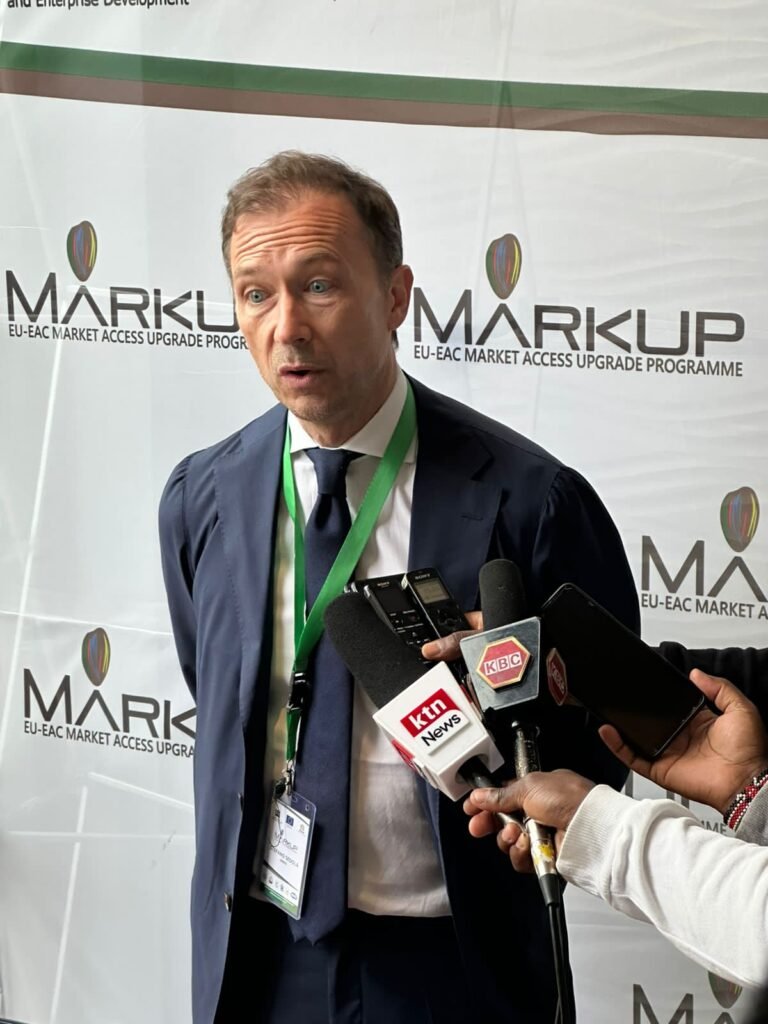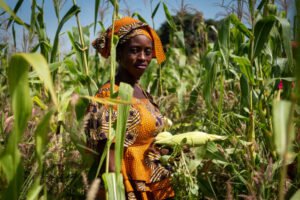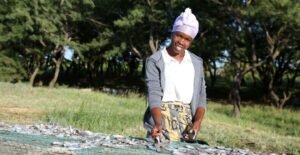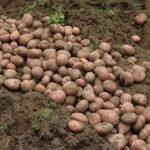Stefano Sedola, the Chief Technical Advisor United Nations Industrial Development Organization (UNIDO), broefinf the media during the closing event at Raddison Blu Hotel, Nairobi. Photo Credit: MARKUP Kenya
By Murimi Gitari June 23, 2023, The EU-EAC Market Access Upgrade Programme has come to an end after a four year implementation in Kenya.
The programme, a 35 million euros regional development initiative funded by the European Union (EU) was part of the European Development Fund that provided support to small and medium-sized enterprises (SMEs) in the East African Community.
Speaking during the closing event held in Nairobi, Stefano Sedola, the Chief Technical Advisor United Nations Industrial Development Organization (UNIDO), said the programme was being implemented in Kenya due to the country’s potential to increase competiveness and market access in the horticultural sector.
“We did this in two ways by strengthening the institutional regulatory framework for safety and worked with producers and exporters through increasing of revenue to the smallholder farmers, reducing the cost of technical assistance required. We also supported exporters to go and identify market opportunities in market linkages like Europe, Middle East and others,” Said Sedola.
The programme’s main objective was to increase exports of agribusiness and horticultural products and promote regional integration and access to European market across 12 counties of implementation in Kenya. It also aimed at addressing both supply side and market access constraints supporting participation in regional and global value chains with a particular focus on exports to the EU.
During the implementation of the programme, there were a couple of challenges that included understanding of food safety issues by the smallholder farmers as it required the use of simple language and not technical terms to these farmers according to the Chief Technical Advisor.
“With the closure of the programme we have witnessed an increase in revenues to farmers at a rate of 60 percent, there was also an increase in marker access by 45 percent. We worked with a community of 1500 farmers and exporters with an ambition to scale up this initiative so as improve productivity and increase revenues in the horticulture sector in the country which had been dominated for years by low productivity and post-harvest losses,” Sedola added.
MARKUP Kenya was able to train 35 county extension officers as GLOBALG.A.P. assurer experts and resulted in the training of 1,416 farmers/producers on GLOBALG.A.P across value chains. The programme saw four regulatory framework and standards upgraded and accepted by main stakeholders.
There was also agreements on access to EU market for Kenya fresh mangoes. The project also saw the training of 76 plant health inspectors and county extension officers from 12 counties on phytosanitary inspection system. Over 700 farmers signed contracts with export companies through the programme.
UNIDO, through MARKUP also worked with Kenya Agricultural Livestock and Research Organization (KALRO) in the development if business plans and procedural manuals for mango, passion fruits, macadamia nuts and groundnuts. KALRO also helped in the provision of clean planting materials for farmers.
Dr Lusike Wasilwa, the Director Crop Systems at KALRO, while speaking during the closing event said that lack of high quality and certified planting materials is a major hindrance to growth and productivity in the horticulture sector.
KARLO in partnership with MARKUP developed manuals to propagate clean planting materails for mangoes, macadamia, groundnuts and passion fruits. The organization also trained nursery staff on mango clean planting materials conducted in Embu, Machakos and Makueni counties.
In terms of food safety and especially in the improvement of institutional regulatory framework for better conformity assessment services in the value chains of groundnuts, macadamia, maize, herbs and spices in relations to aflatoxins control, MARKUP was able to implement a set of activities that induced development of an Aflatoxin Management and Control training manual, Standard Operating Procedure (SoPs) and codes of practice, to strengthen capacity of key actors along the value chain in addressing aflatoxins contamination.
The training manual provides the needed support in equipping various stakeholders including but not limited to regulators, extension officers, producers and traders.
MARKUP was also able to run an aflatoxin awareness campaign on digital and traditional media with a reach of 2.6 million people. More than 200 farmers were sensitized in aflatoxins and its management in Homabay, Siaya and Busia counties of which over 50 percent farmers were women.
Bernard Kiio, one of the direct beneficiaries of the project and a mango farmer from Makueni County appreciated the support of the programme saying as a farmers from Makueni they have reaped big in terms of increased production and revenue generation from the same.
“From this project we have been trained on how to take care of our mango trees in terms of pruning, pesticides application and market accessibility. We have been taken through the process of getting certified by relevant bodies for the export markets,” Kiio explained during a media interview.
He also noted that before the programme he used to only harvest two tonnes of mangoes but currently he harvest even up to 11 tonnes in a season.
The UNIDO component of the EAC-EU MARKUP programme was implemented in close coordination with the Ministry of Trade and Industry of Kenya, the EU Delegation to Kenya and other implementing agencies that included ITC and GIZ.
The programme supported the government’s efforts to strengthen the economy through increased agricultural production, valued addition and agro-processing, as well as trade expansion.







